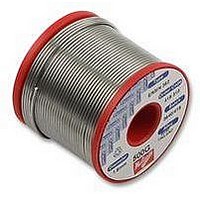D6192 MULTICORE (SOLDER), D6192 Datasheet

D6192
Specifications of D6192
D6192 Summary of contents
Page 1
... TIN/LEAD ALLOYS From the following diagram, it can be seen that most tin/lead solders have a plastic range, i.e. on heating they are pasty between the solid and liquid states. The solders are solid at 183°C (361°F). According to the alloy composition they have different plastic ranges. 60/40 tin/lead alloy for example becomes liquid at 188° ...
Page 2
... A good joint is thus obtained ordinary tin/lead alloy is used on silver-plated surfaces, the silver can be lifted from the surface and dissolved into the solder so that a good joint is unlikely. The attachment of terminations in the manufacture of silver ceramic capacitors is a typical application. ...
Page 3
... Sn62 90 The UTS listed above refers to the bulk solder. The values give a guide to the relative strengths at room temperature of identical joints made with different solder alloys, but should not be used to calculate absolute joint strengths, which depend primarily on the conditions of test; thanks are due to the International Tin Research Institute for their co-operation in arriving at values all determined under the same conditions, viz specimens freshly cast at 50° ...
Page 4
... MULTICORE SOLDERS These data are based on information believed to be reliable and are offered in good faith, but MULTICORE MAKES NO WARRANTIES EITHER EXPRESS OF IMPLIED AS TO THEIR ACCURACY AND ASSUMES NO LIABILITIES ARISING OUT OF THEIR USE BY OTHERS as conditions and methods of use of the products are beyond MULTICORE’S control. The prospective user should determine the suitability of the product before using commercial scale. MULTICORE warrants only that the product will conform to its physical descriptions ...



